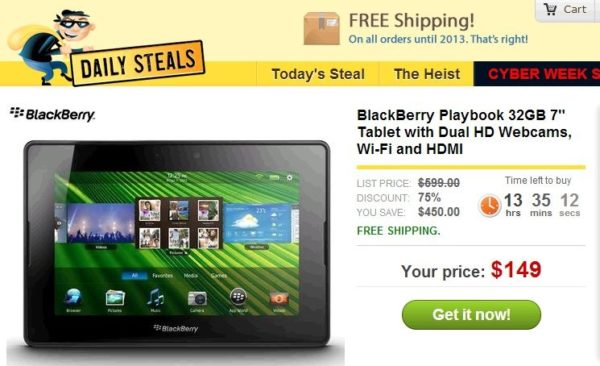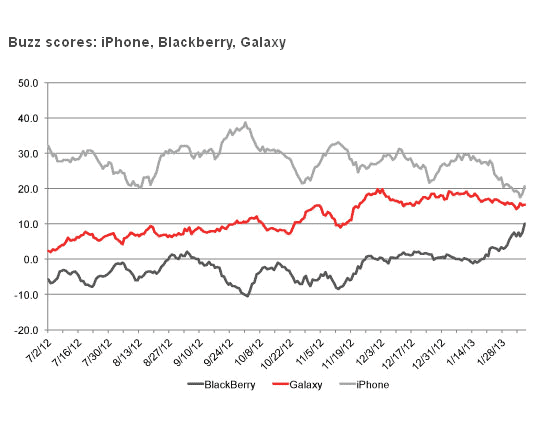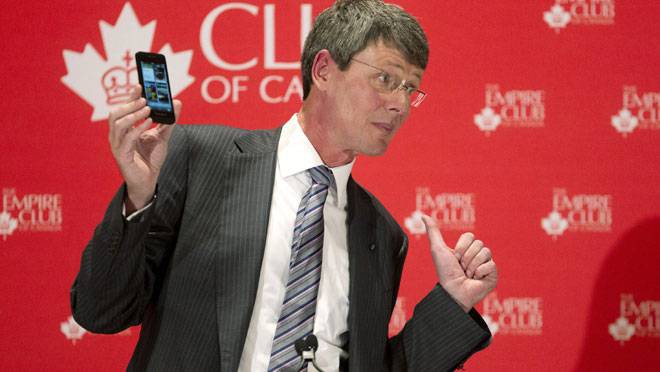What’s wrong with the BlackBerry PlayBook?

So what’s wrong with the BlackBerry PlayBook? The answer, for you and me, who can pick up a powerful and mobile computer for the cost of nice dinner for two, is absolutely nothing; the device stands as a shining example of how consumers win when competition reigns. “What’s wrong with the PlayBook?”
Those were the first words of a Facebook private message conversation with a friend from the east coast last night. Write a bunch of articles with a generally supportive bent about RIM and you sometimes unwittingly become embroiled in the company’s marketing efforts.
“What do you mean?” I replied, half-knowing where the conversation was headed.
“I was looking at tablets for my wife for Christmas, and I saw Future Shop had the 32GB version for just $129 a while back. I thought $199 for the 16GB last year was their fire sale price. Are they discontinuing it?”
Since this is not the first time I have had such a conversation and, I expect, won’t be the last, here are my thoughts on the matter.
First, there are no indications that RIM has plans to discontinue the PlayBook, though it did stop producing the entry level, 16GB version earlier this year. The company has been consistent in this message, and I suspect the stance comes at least in part out of stubbornness that the product will continue to have a life, and not be regarded as an unqualified failure like the HP Touchpad, which was axed fifty days after its debut. That said, selling the BlackBerry Playbook at $129, or $199 for that matter, seems untenable in the long run.
Here the thing: outside of research and development expenses, the cost to produce a BlackBerry Playbook is about $205. The cost for an iPad? About $280. But the iPad commands a $499 price tag. OK, but what about the Amazon Kindle? The Amazon Kindle Fire costs $201.70 to make. Amazon loses money on each Kindle it builds, but the potential to recoup the cost by selling e-books and video content is surely multiples of what RIM might make back selling PlayBook apps, considering the well documented struggles of RIM to match rivals in making money from content.
With an original retail price of $499, Research in Motion clearly did not intend to lose money on the Playbook. But with sales lagging, (IDC reported that RIM was able to secure just 4.9% of the tablet market in 2011) and an inventory buildup that was approximately three-quarters of a billion dollars more than it was just six months prior, RIM decided, late in November of last year, to offer promotional plans that led to retailers slashing the price of Playbooks by $300.
_________________
This article is brought to you by Ackroo (TSXV:AKR). Ackroo enables small to medium sized businesses, independent merchants and business networks to increase profitability and build long-term customer relationships through customized loyalty and rewards programs. Click here for more info.
______________
Meanwhile, the competition in the tablet space has become fierce, and Apple’s once dominant hold is slipping. Its share of the segment dropped from 68.2% in Q2 2012 to 57% in Q3 of this year alone.
A major issue with the BlackBerry Playbook, for many, used to be a question of form over function; some believed its postcard size screen was simply too small. The late Steve Jobs himself famously quipped that seven inch tablets were “dead on arrival”. That, of course, has been utterly disproved by the iPad mini, which launched November 2nd to sales of more than two-million in its first weekend. With an Apple to apples (pun intended) comparison between the iPad and the PlayBook now a reality, many will no doubt be tempted by the lower priced option heading into the Christmas season.
The fact is, especially after its OS2 update in February, which improved BlackBerry Bridge, the device’s email, and its document management, the PlayBook stacks up very well against the iPad mini. In fact, after the initial “me too” pile on of negative reviews from the tech media, most takes on the device have been down right exuberant.
One of the more recent reassessments came from Sync’s Lee Matthews, who said “The PlayBook has a lot going for it, too. It’s one of the best-built tablets I’ve ever had in my hands, its battery life improved immensely after the PlayBook OS 2 update arrived, and its screen is bright and crisp. It’s got a slick Wi-Fi file sharing feature built in that makes moving photos, music, movies, and files a breeze. It’s got an excellent web browser that’s based on the Webkit engine (the same core that powers Google Chrome and Safari), and it even displays Flash content — not many other tablets bother to do that any more, and it’s quite handy at times.”
Many other reviews, written after the operating system update and price drop concurred. Mobile Syrup called the PlayBook “best tablet bang for your buck.”
PCMag said the lower priced PlayBook’s “…user interface is beautiful, graceful, and operates with a simplicity that rivals that of the Apple iPad 2 ($399 for 16GB, 4.5 stars) and bests current Android tablets…” And ZDNet’s Matthew Miller, perhaps most enthusiastically of all, said “Forget the Amazon Kindle Fire, the BB PlayBook is now the best low cost tablet…”
So what’s wrong with the BlackBerry PlayBook? The answer, for you and me, who can pick up a powerful and mobile computer for the cost of nice dinner for two, is absolutely nothing; the device actually stands as a shining example of how consumers win when competition reigns. For Research in Motion, faced with declining margins in a space where tablets have become lost leaders in the content wars, the answer is somewhat more complicated.
_____________
_____________
Nick Waddell
Founder of Cantech Letter
Cantech Letter founder and editor Nick Waddell has lived in five Canadian provinces and is proud of his country's often overlooked contributions to the world of science and technology. Waddell takes a regular shift on the Canadian media circuit, making appearances on CTV, CBC and BNN, and contributing to publications such as Canadian Business and Business Insider.


